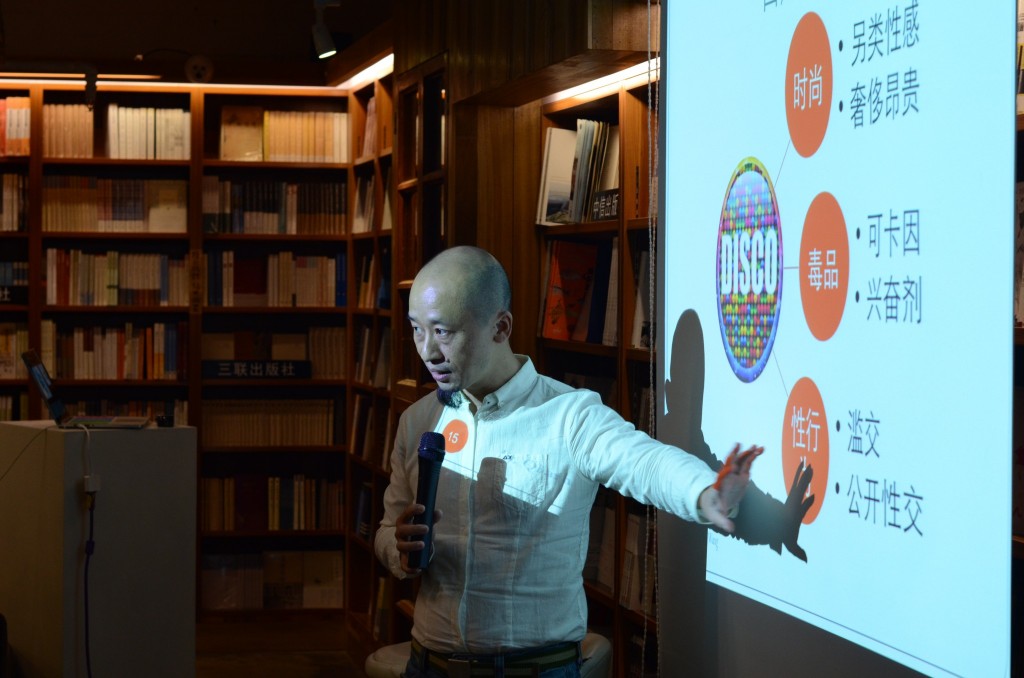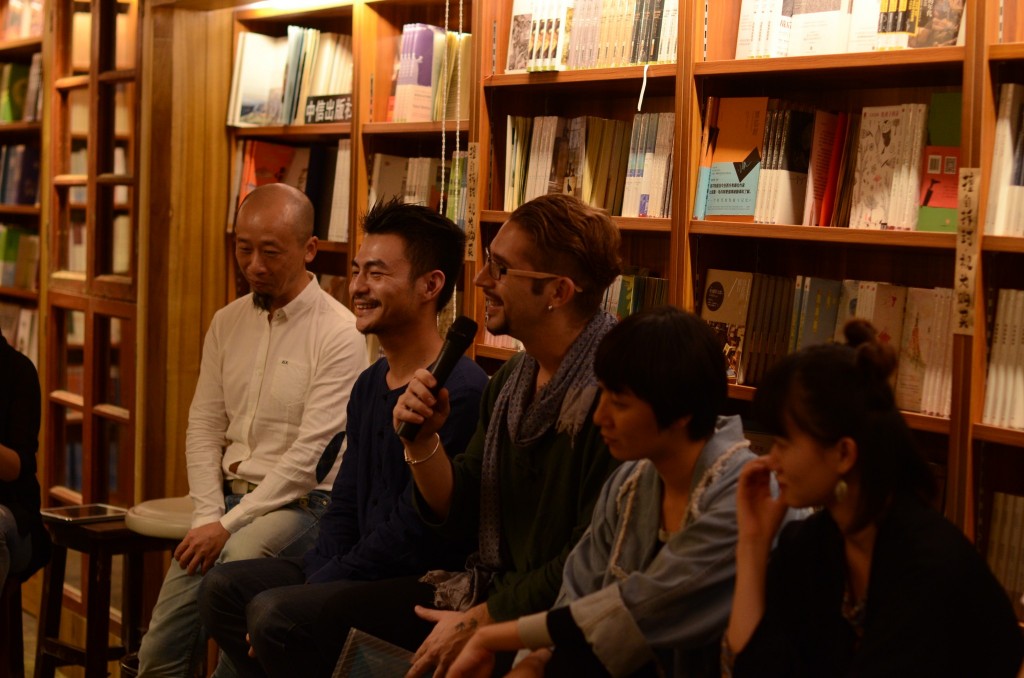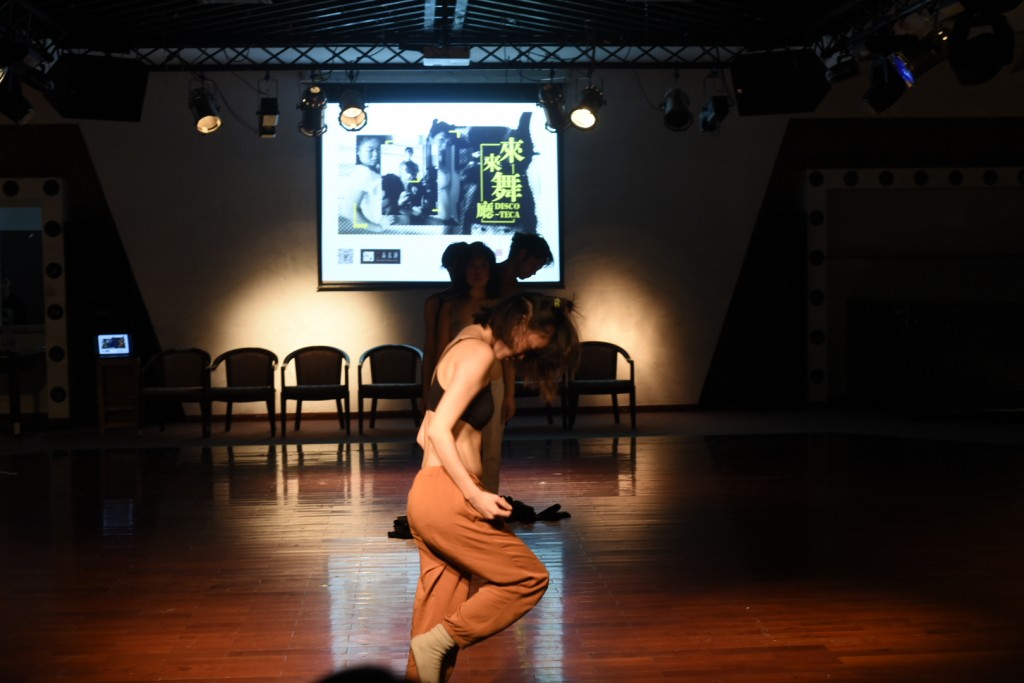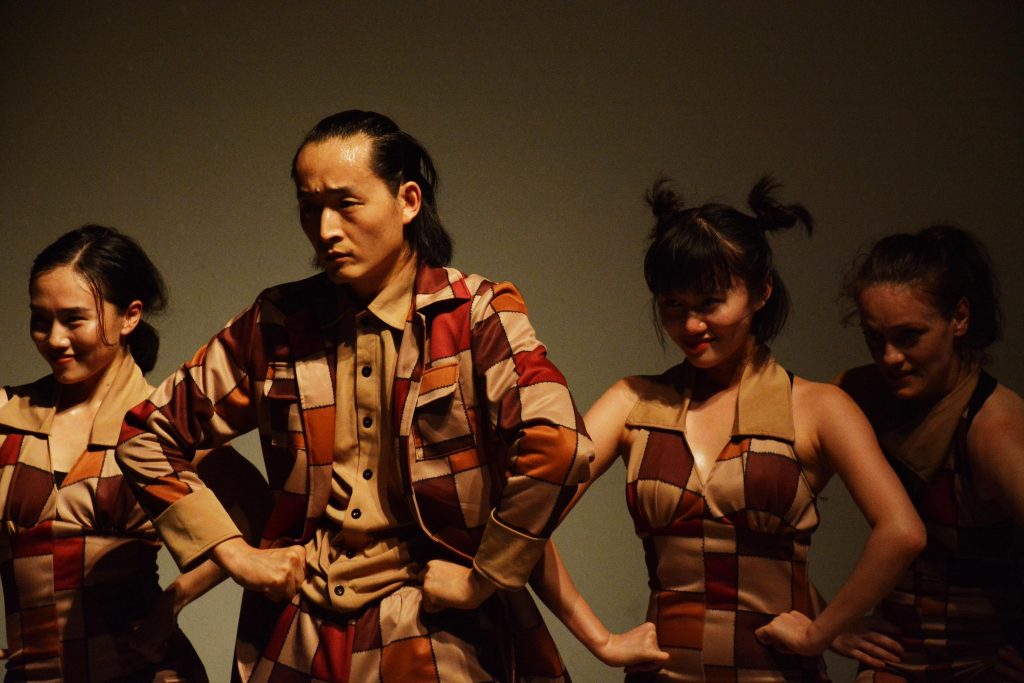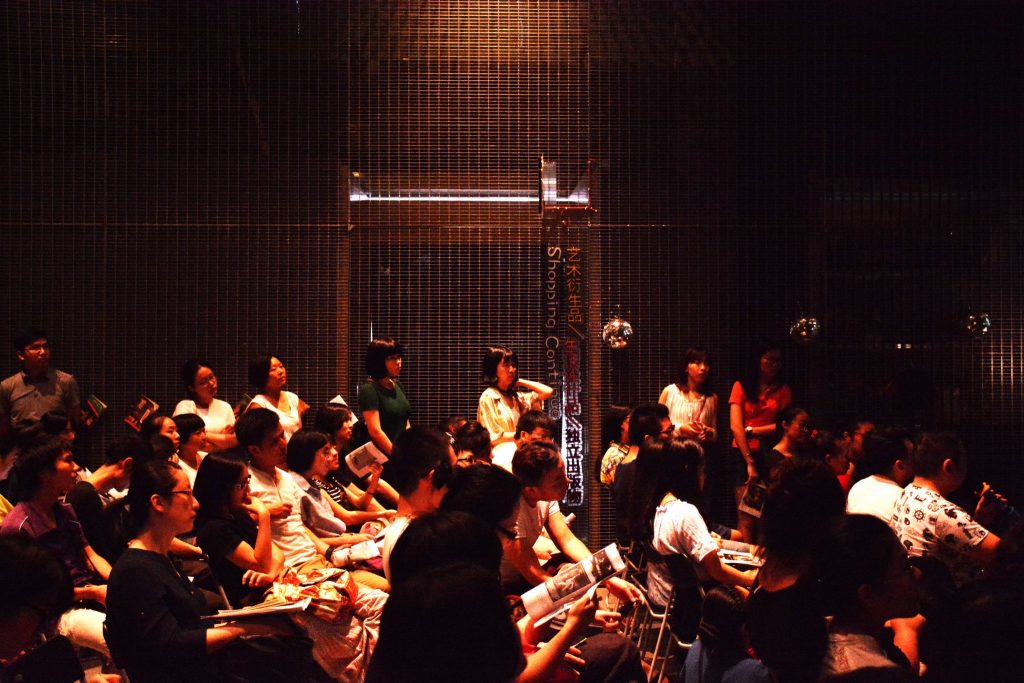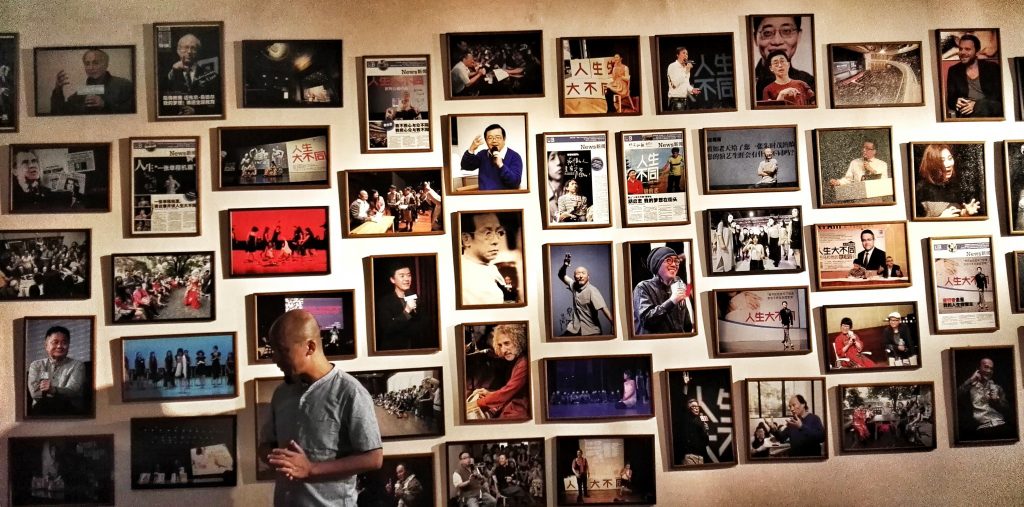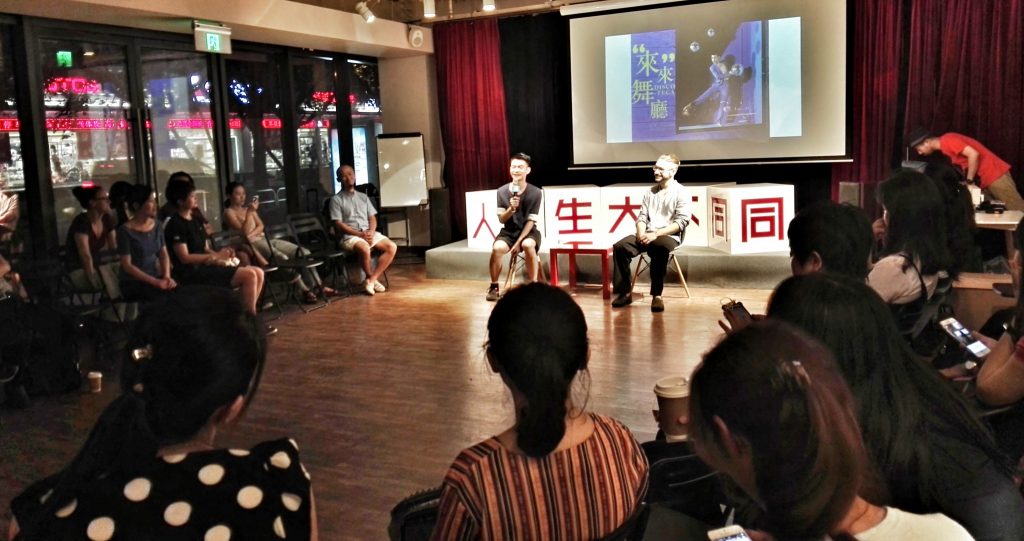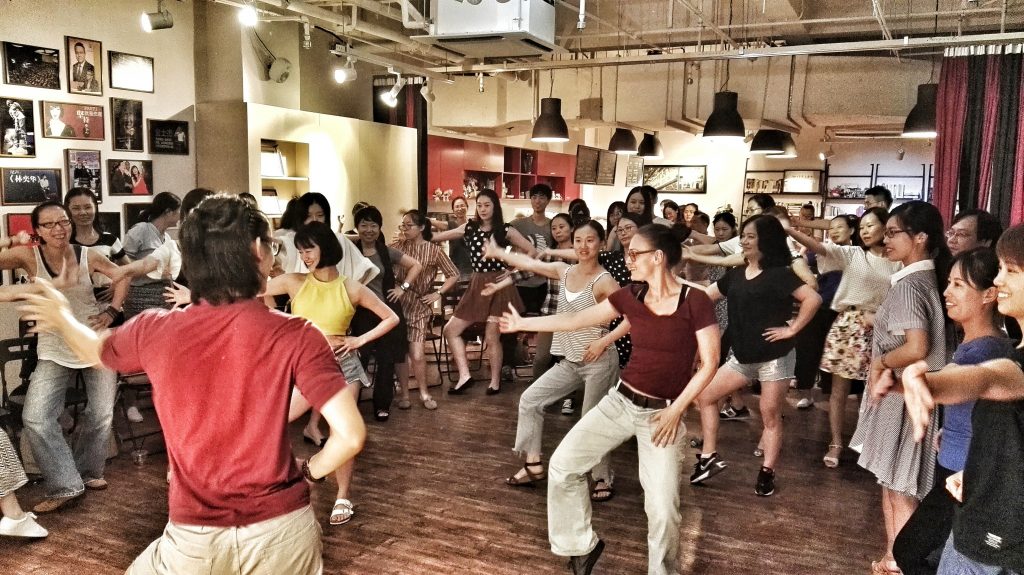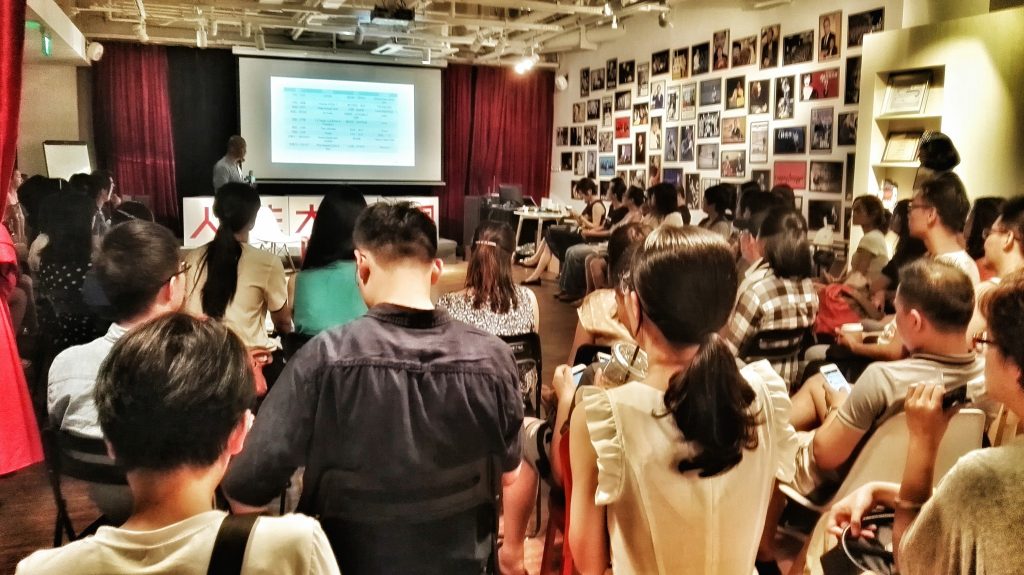-
Calendar 2024
Calendar 2023
Calendar 2022
Calendar 2021
Calendar 2020
-
Children of Ginko – Preview
31 October, Shanghai
-
Children of Ginko – Premiere
7-8 November, Shanghai,
Calendar 2019
-
Dance Dramaturgy 2.1
23-23 April, Aosai Space, Dali
-
New Text New Stage – “A Deal” Australian Premiere
23-31 August, Sydney
Calendar 2018
-
Web Traffic — A Multimedia Dance Theatre
Jan.5-7th , Shanghai International Dance Center
-
China ComingOUT – Creative Writing for LGBTQ Youth
31st Jan.-4th Feb. , Destination, Beijing.
-
SPEAK OUT: #1 LGBTQ&Perfromance BJ
7th, April , Italian Institute of Culture, Beijing
-
SPEAK OUT: #2 Performance&Performativity
8th, April , Xiaozhong Bookstore, Beijing
-
SPEAK OUT: #1 LGBTQ&Perfromance SH
10th, April , NEXTMIXING, Shanghai
-
SPEAK OUT: #1 LGBTQ&Perfromance GZ
12th, April , Ergao Dance Production Group, Guangzhou
-
SPEAK OUT : #3 Gender, Documentary and Activism
19th, May, Bookworm, Beijing
-
China ComingOUT – Creative Writing for LGBTQ Youth
23rd, May-26th, May , Zizai Studio, Shanghai
-
LookOUT- Arts Festival on Gender
July 6-15, 2018, Beijing, 798 Art District
-
Let You Be rerun in Beijing Penghao Theatre
26-27th, July , Penghao Theatre, Beijing
-
I Disappear Premiere in Beijing
28th, 29th, July , Penghao Theatre, Beijing
-
Dance Dramaturgy Workshop I
27th,Aug.-2nd, Sep., Free Theatre Alliance Rehearsal Center, Beijing
-
China ComingOUT——Creative Writing for LGBTQ Youth
25th-28th, October , There Art Center, Guangzhou
-
Dance Dramaturgy Workshop II
30th, Oct.-1st, Nov. , Free Theatre Alliance Rehearsal Center
-
MOVING WOR(L)DS – International forum on theatre & migration
7-17th December , Nanjing University, Nanjing, Jiangsu Province, China
Calendar 2017
-
“When Swallows Cry” South African Premiere Reviews
January, Market Theatre Complex, Newtown Johannesburg Gauteng South Africa
-
Frozen Songs Excerpts Presented at Shanghai Project Chapter 2 Opening
April , Shanghai Himalayas Museum
-
The Returning/ Winterreise with Chinese Cast Premiere in Shanghai
21st-23th, July, Shanghai Huangpu Theatre; 28th-29th, July, Penghao Theatre Beijing
-
I Disappear Stage Reading in Penghao Theatre Beijing
July 26th, 14:30/19:30 Penghao Theatre
-
Frozen Songs Premiere at The Arctic Theatre
September,7th, Tromsø, Norway, Arctic Theatre(Hålogaland Teater )
-
Disco-Teca at STOFF – Stockholm Fringe Festival
9th, September, Teater Tre, Stockholm, Sweden
-
Let You Be Premiere in Beijing
September, 25th-26th, 7:30pm Qinglan Theatre
-
Let You Be Tour in Hangzhou Contemporary Theatre Festival
28th, September, Zhejiang Province Culture Center Small Theatre.
-
Disco-Teca at We Festival of Future Shanghai
October, 7th-8th, No.6 Space, West Bund Camp 3399, Shanghai
-
New Text New Stage II Tatarstan Production Premiere
14th, 15th, 17th, October, 2017, Galiaskar Kamal Tatar National Academic Theatre, Tatarstan
-
New Text New Stage II Chinese/American Production Coming Up
Nov 15th-Dec.10th, Urban Stages Theatre, New York. Sep.24th-30th, Nanjing University, Jiangsu, China.
-
About My Parents and Their Child Touring in Shanghai
December, 9th-10th, Shanghai Dramatic Art Center 1933 Micro Theatre.
-
Contextualizing Dance Dramaturgy – Workshop Series BJ
Dec. 22nd , Goethe Institut China, Beijing
-
Contextualizing Dance Dramaturgy – Workshop Series GZ
Dec. 25th , Ergao Dance Production Group, Guangzhou
-
Contextualizing Dance Dramaturgy – Workshop Series SH
Dec. 30th , Camp 3399 #6 Space, Shanghai
Calendar 2016
-
Night Shift, Beijing rerun
8-9 January, Qinglan theatre, Beijing
-
Ghost 2.0, Beijing rerun
21st-24th, Jan. , Beijing Tianqiao Performing Arts Center
-
SEEDS – A Global Art and Media Project
1-11th, March, Drum Tower West Theatre, Beijing, China
-
Sleeping Beauties—Dancing & Multimedia Workshop Demonstration
6th, March, Drum Tower West Theatre, BJ
-
NEW TEXT, NEW STAGE II – Session 3
20th-26th, March , Guangzhou Dramatic Art Center. There Art Space in GZ
-
Free Theater Alliance – Launch of 1-2-3 Theatre
April, 18th, Qinglan Theater, Beijing
-
Jon Fosse’s Dream of Autumn BOOK LAUNCH
23 April, JEWELVARY Art & Boutique
-
PRACTICAL RETHORIC Workshop (SH)
6月19日, Internet Education Plaza, Shanghai
-
PRACTICAL RETHORIC Open Demonstration (GZ)
July 2, There Art Space, Guangzhou
-
Disco-teca Open Presentation (GZ)
July 9, Guangdong Times Museum, Guangzhou
-
PRACTICAL RETHORIC Open Demonstration(SH)
July 10, RSDBT. Shanghai
-
DISCO-TECA in Shanghai
July 12-13, 1933 Micro Theatre
-
Disco-teca Open Presentation (SH)
July 15, RSDBT, Shanghai
-
In the Field of Hope
July 18-19, Gulou West Theatre
-
About My Parent and Their Child
July23-24, Gulou West Theater · Beijing
-
DISCO-TECA in Beijing
July 23-24, Gulou West Theatre
-
Ghost 2.0 at Wuzhen Theatre Festival
13th, 14th October , Wuzhen, China
-
Workshop by Jon Tombre
12th-13th, November, FTA Rehearsal Space, Beijing
Calendar 2015
-
Practical Rhetoric – Workshop 1
13-18 March, Beijing, Here&Now Studio
-
New Takes on IBSEN
April, 22nd-26th, Shanghai, China
-
Ibsen in One Take – Shanghai 2015
23-24 April, Himalaya Center, Shanghai
-
Night Shift – Norwegian Tour
May 27, 30, Lilehammer, Oslo
-
Practical Rhetoric – Workshop 2
24-28 June, Beijing, Here&Now Studio
-
NEW TEXT, NEW STAGE II – Session 1
13-18 July 2015, Pioneer Theatre, Beijing
-
GHOSTS 2.0
7-9 August, McaM Museum, Shanghai
-
Comedy of Love, Premiere
30th, Sept.-4th, Oct., Penghao Theater, BJ
-
Practical Rhetoric – Workshop 3
3-7 October, Here&Now Studio, Beijing
-
Workshop on Jon Fosse
Oct. 5th-10th , Sheung Wan Municipal Services Building, HK
-
Practical Rhetoric: Launch at Norwegian Embassy
8 October, Norwegian Embassy, Beijing
-
DISCO-TECA, open workshops
10-14 October, Guangzhou
-
Practical Rhetoric:Workshop at Bernard Controls
10 October, Bernard Controls China, Beijing
-
NORA – Norwegian Tour 2015
October 28 - November 3, Bodø; Tromsø; Trondheim
-
DISCO-TECA, premiere
4-5 November, Gender Bender Festival, Bologna
-
Night Shift Guangzhou Tour
13-15th, November, Guangzhou Dramatic Art Center
-
NEW TEXT, NEW STAGE II – Session 2
Nov. 15th-22nd, Shanghai Ming Contemporary Museum, Shanghai Dramatic Art Center
-
Night Shift Shanghai Tour
21-22, November , Shanghai Dramatic Art Center
-
DISCO-TECA: live performances & media feedback
December, 17th, DPAC, Malaysia
Calendar 2014
-
Artists’ Talk Series 1: Architecture and Scenography
January 21 - 27th, Ibsen International Office, Beijing
-
Artists’ Talk Series 1: New Media and Theatre
29th March, Ibsen International Office, Beijing
-
New Texts, New Stage – Session 3
5th - 10th May 2014, Pioneer Theatre, Beijing
-
HEDVIG from the Wild Duck – Oslo
14-16th August, Oslo Opera House, Norway
-
GHOSTS 2.0
6-7 September, Beehive theatre, Beijing
-
Artists’ Talk Series 1: Drama, Communication and Society
7th September, Ibsen International Office, Beijing
-
Ibsen in One Take – Ibsen Festival Oslo
12th September, Oslo,
-
Night Shift – Beijing Fringe Festival
16th-17th September, Beijing Fringe Festival
-
Ibsen in One Take – OzAsia Festival
16-17th September, Adelaide,
-
The phenomenon: Hedda Gabler
11th-12th October, Penghao Theatre, Beijing
-
Night Shift – Beijing Rerun
13th October, Gulou West Theatre. Beijing
-
NORA – World premiere
30-31 October, Tianjin Grand Theatre, Tianjin
-
Jo Strømgren Kompanis at Guandong Modern Dance Festival
November 10-12,2014, Xinghai PA Garden,Guang Zhou, China
-
Jon Fosse’s Blossoms In Shanghai International Contemporary Theatre Festival 2014
November 21-29,2014, Shanghai Dramatic Arts Centre, China
Calendar 2013
-
New Texts, New Stage – Session1
16th - 20th April, Star Theatre, Beijing
-
HEDVIG from the Wild Duck
28-29th June, Kwai Tsing Theatre Auditorium, Hong Kong
-
HEDVIG from the Wild Duck – Beijing
23rd July, People Liberation's Army Theatre, Beijing
-
Carcass
26th July 2013, Star Theatre, Beijing
-
Ibsen in One Take – Netherlands
27 - 28th September, Rotterdam
-
Ibsen in One Take – China tour
13 - 16 November, Guangzhou and Shanghai
-
New Texts, New Stage – Session2
23rd November - 1st December, Penghao Theatre, Beijing
-
The Name – Jon Fosse
28 November - 15 December, Shanghai
Calendar 2012
-
The Jon Fosse Project in China
-
The Name
7-11 March, 2012, New Space Theatre, Shanghai
-
Dance Workshop in Beijing with Johannessen for LDTX
13 - 25 April 2012, Beijing
-
Writing Text for Opera
October 11th - 13th 2012, Bergen
-
Field Works
November 22nd - 30th, Macau, Guangzhou, Shenzhen
-
Ibsen in one take
28th November - 1st December, Beijing
-
RETURN _ a devised dance piece
27th November - 6th December, Guangzhou Modern Dance Festival; Singapore Connect Festival.
Calendar 2011
-
Workshop collaboration
23-24 April, Tianqiao Theatre Beijing
-
Masterclass by choreographer Ingun Bjørnsgaard
25 July, Guangzhou
-
Building International Network – seminar Guangdong Moderne Dance Festival
26 July at 11.00, Guangzhou
-
The Name by Jon Fosse, production The New Norwegian Theatre
23 September at 19.15, Venue: The New Stage at Shanghai Theatre Academy, 630 Huashan Rd, Shanghai
-
The Name by Jo Fosse, production The New Norwegian Theatre
24 September at 15 and 19.15, Venue: The New Stage at Shanghai Theatre Academy, 630 Huashan Rd, Shanghai
-
The second Ibsen Festival for Students in China
21 – 23 October, Nanjing
-
The Jon Fosse Project in China
November 4, 2011, 20:00 , The New Space at Shanghai Theatre Acedemy, 630 Huashan Rd., Shanghai, in collaboration with TTS Group
-
International Seminar: Staging Ibsen Today
31 October – 4 November, Beijing
Calendar 2010
-
Ibsen live in China – an exhibition
5 October - 4 November, Hangzhou, Shanghai, Nanjing and Beijing
-
The Lady From the Sea
5 and 6 October 2010, Hangzhou
-
The Lady From the Sea
14 and 15 October, Yi Fu Stage, Shanghai
-
Symposium on Ibsen and Interculturalism in China
15 October, Shanghai Theatre Academy
-
A Doll’s House
22, 23 and 24 October, Capital Theatre, Beijing
-
China International Ibsen Festival for Students
22, 23 and 24 October, Nanjing University
-
Workshop based on Jon Fosse’s work
25 - 29 October, Shanghai Theatre Academy
-
Someone Is Going to Come by Jon Fosse
26 October to 4 November 2010, New Theatre Stage, Shanghai Theatre Academy
-
DISCO-TECA: research & open presentations
Research&Development phase:
June-October, 2015
Open presentations:
10 October, 7:00 – 9:00 pm, Lianhe Bookstore, Guangzhou;
11 October , 8:00 – 10:00 pm, 1200 Bookstore, Guangzhou;
12 October, 6:30 – 8:30 pm, Guangzhou Fine Arts Academy, Guangzhou;
13 October, 8:00 – 10:00 pm, Yi-gether Center, Guangzhou;
July, 2016
Open presentations:
9 July, 3:30-5:30 pm, Guangdong Times Museum
15 July, 7:30-9:30 pm, RSDBT
THE CONCEPT:
Disco as Culture of Transition
 After a meeting in November 2014 at the Guangdong Dance Festival, choreographer Er Gao and Ibsen International’s project manager Fabrizio Massini start discussing a new project. The core concept is the appearance of disco music in the 1980s, when China opens its doors to the world. A fresh breeze sweeps the country from the south; through a triangular route via colonial Hong Kong, disco music bursts in. A hurricane of synthesizers, lascivious moves, and wild hairdos storms the Popular Republic. After 3 decades of collectivism, the germs of individualism reappear in the ballrooms, floating along with the skirts, reflected in the disco balls. The Pandora’s Box of sexuality, gender, body, and pleasure in Disco music was opened.
After a meeting in November 2014 at the Guangdong Dance Festival, choreographer Er Gao and Ibsen International’s project manager Fabrizio Massini start discussing a new project. The core concept is the appearance of disco music in the 1980s, when China opens its doors to the world. A fresh breeze sweeps the country from the south; through a triangular route via colonial Hong Kong, disco music bursts in. A hurricane of synthesizers, lascivious moves, and wild hairdos storms the Popular Republic. After 3 decades of collectivism, the germs of individualism reappear in the ballrooms, floating along with the skirts, reflected in the disco balls. The Pandora’s Box of sexuality, gender, body, and pleasure in Disco music was opened.
PHASE 1:
Academic & Performative Research
In July 2015 Dr. Wang Qian, music sociologist, joins as an adviser to provide insight on the phenomenon of disco culture in the Greater China region (mainland, Hong Kong, Taiwan). Like disco culture the project transforms, 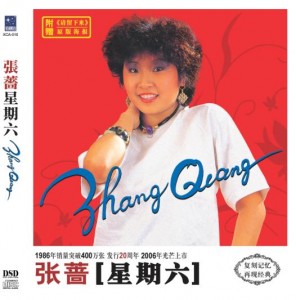 becoming a multidisciplinary investigation that combine performance with academic research. The common research points: how are cultures globalised/localised in the process of cultural fusion? What is preserved, transformed, and written off? How are music, body, dance, gender performance/performativity, and gender identity knitted into a sophisticated relationship?
becoming a multidisciplinary investigation that combine performance with academic research. The common research points: how are cultures globalised/localised in the process of cultural fusion? What is preserved, transformed, and written off? How are music, body, dance, gender performance/performativity, and gender identity knitted into a sophisticated relationship?
Between August-October 2015, a group of dancers from mainland China, Macau and Malaysia start working under the direction of Er Gao, to explore the topic from a micro-perspective: how does going to a disco club contribute, now as in the 80s, to the construction of the self? How do rhythm and melody awake human body and desire? The academic research provides a wider background: how does the appearance of private disco clubs change the social landscape? what changes in fashion, popular culture, relationship between generations and genders? How do the micro-level of subjectivity interact with the macro-level of society?
PHASE 2:
Seminars and open demonstrations
Since 2014, we organized 6 demonstrations open to the public in different venues (bookshops, fine arts academies, museums, cultural centres). These demonstrations serve a double purpose.
On one hand, they are an occasion to share knowledge about Disco music, and the impact it had on society in the 1960s – 1980s. The program starts with a lecture by Dr. Wang Qian about the birth of Disco, its origins and development, and its migration from the USA and Europe to mainland China via Hong Kong. Afterwards, the dancers share an excerpt from the performance, and invite the audience to learn iconic disco music steps.
On the other hand, the presentations offer a feedback about the audience’s understanding of, and relationship with, Disco music and the Disco era. This information is precious for our academic research project, led by Dr. Wang Qian, and to our creative team, who continuously adjusts and enriches the performance.
PHASE 3:
Live performances
The solo version of “DISCO-TECA” premiered on November 4 at Gender Bender Festival (Italy). Since November 15, the group version of “DISCO-TECA” has toured in China (Guangdong Dance Festival, Shanghai 1933 theatre, Beijing Nanluoguxiang Festival) and Malaysia (D’Motion Dance Festival). For further information please see DISCO-TECA: Live performance
Pictures and comments from the open demonstrations
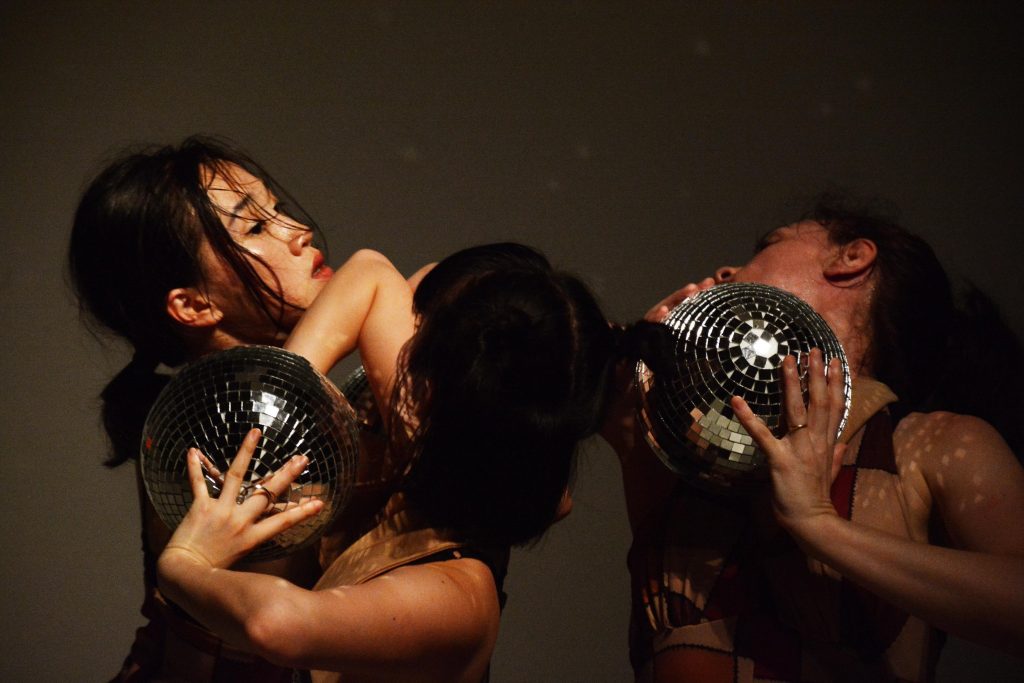
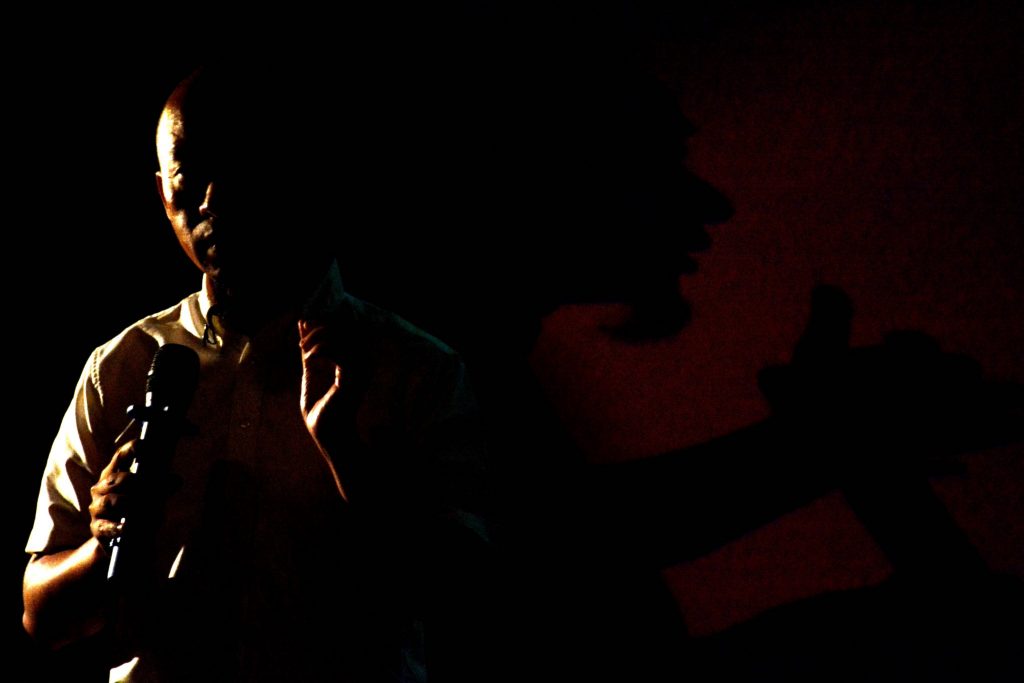 Guangdaong Times Museum/ Picture by Vincent
Guangdaong Times Museum/ Picture by Vincent
Audience Feedback:Nostalgia is a way for people to recall the times past, a kind of private childhood or teenage years. All the things from that era have disappeared or have been thrown away, same as one’s childhood or teenage years. We miss the most what we cannot find. All the feelings of the past are associated with something that remind us of them _ some food, an old song , a picture , a building. Or it can be a fragrance and a kind of collective effort, that combined together makes what we call an era .@CICICAT
Guangdaong Times Museum/ Picture by Vincent
Audience Feedback:Finally I was convinced. Leaving the spectator’s perspective, in fact, is vague and subjective. The sincere feeling is to participate and face one’s own desire, joining another group of people who are transparent and generous. As hot winds of summer gradually quiet down, the Shanghai night was really beautiful. I cannot stop thinking: what a beautiful world!@ Lotus Fan
RSDBT/ Picture by Connie
Audience Feedback: A very “complete” work. This “completeness” includes a look toward life, the interpretation of humanity. Being complete doesn’t mean to be perfect. It takes flaws, fragility and differences to make a complete world. Are you perfect? Or complete? @Jesse
RSDBT/ Picture by Connie
BIOs
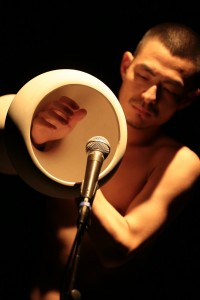 Er Gao, alias Ho Qi Wo, is an independent dancer and choreographer from Guangzhou, China. As one of the pioneers of dance theatre in mainland China, Er Gao creates works of rich imagery and focused on themes such as sex, gender and identity.
Er Gao, alias Ho Qi Wo, is an independent dancer and choreographer from Guangzhou, China. As one of the pioneers of dance theatre in mainland China, Er Gao creates works of rich imagery and focused on themes such as sex, gender and identity.
His works have been invited to various festivals including Beijing Crossing Festival, COART Festival, Shanghai Fringe Festival, Hong Kong I-Dance Festival, Dance Wave Fukuoka 2008. In recent years he was commissioned by the 41st Hong Kong Arts Festival and 10th Guangdong Dance Festival. His piece “Supertight” was featured in the exhibition “30 years of experimental theatre” at McaM museum (Shanghai). “Lucy”, one of his latest dance videos, has been included in the Festival de Cannes 2014 Short Film Corner.
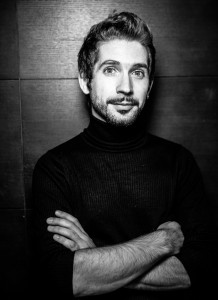 Fabrizio Massini is a theatre practitioner. Starting off as an actor and director in Florence, since 2002 he started studying Chinese culture and theatre in Florence, London (SOAS) and Beijing (Central Academy of Drama). Based in China since 2009, Fabrizio is active as artistic consultant and performing arts producer for several institutions in Europe and China including Beijing Fringe Festival, Wuzhen Theatre Festival, Guangzhou Dance Festival, Intercity Festival (Italy) and Odin Teatret (Denmark). He also curated workshops, forums and gave guest lectures for the Danish National School of Performing Arts, National Theatre Company of China and others. Since 2016, Fabrizio is Artistic Director at Ibsen International.
Fabrizio Massini is a theatre practitioner. Starting off as an actor and director in Florence, since 2002 he started studying Chinese culture and theatre in Florence, London (SOAS) and Beijing (Central Academy of Drama). Based in China since 2009, Fabrizio is active as artistic consultant and performing arts producer for several institutions in Europe and China including Beijing Fringe Festival, Wuzhen Theatre Festival, Guangzhou Dance Festival, Intercity Festival (Italy) and Odin Teatret (Denmark). He also curated workshops, forums and gave guest lectures for the Danish National School of Performing Arts, National Theatre Company of China and others. Since 2016, Fabrizio is Artistic Director at Ibsen International.
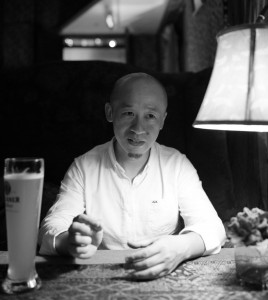 Qian Wang earned his PhD in popular music studies from the Insitute of Popular Music, the University of Liverpool, and did his post-doctoral research at the Department of Sociology, Tsinghua University. He is currently a lecturer at the School of Literature and Journalism, Yibin University, and a visiting scholar of Fudan Journalism School. His research is mainly focused on the interrelationship between Chinese/Sinophone popular music and China’s society. He is particularly interested in few issues, such as sexuality, gender, queer, politics, and social movements, which objectively reflect the transformation of China since the economic reform in 1979.
Qian Wang earned his PhD in popular music studies from the Insitute of Popular Music, the University of Liverpool, and did his post-doctoral research at the Department of Sociology, Tsinghua University. He is currently a lecturer at the School of Literature and Journalism, Yibin University, and a visiting scholar of Fudan Journalism School. His research is mainly focused on the interrelationship between Chinese/Sinophone popular music and China’s society. He is particularly interested in few issues, such as sexuality, gender, queer, politics, and social movements, which objectively reflect the transformation of China since the economic reform in 1979.
